PRODUCTS

From Getting Started to Graduation: A Student Guide to the EdD, a volume in The Coming of Age of the Education Doctorate Series book series, pulls back the curtain on the hidden curriculum of the EdD experience for students, fully supporting their journeys by making what is too often anxious and abstract more clear and concrete. Drawing from years of experience from designing and directing an EdD program, the authors provide an end-to-end playbook for students to draw from as they navigate their own EdD program of choice.
Part I focuses on getting started. The book begins with an establishment of the why behind getting an EdD and how this is a distinct and unique experience unlike other graduate degrees. It pushes readers to think beyond the title, encouraging them to drill down into their core motivation for pursuing not just a degree but a transformative experience. Readers will then learn about finding the match quality between their goals and aspirations and the myriad program choices available to them. Once students have winnowed down their choices and found their fit, they will be coached on how to build survival systems that will help them thrive from the onset to the finish line. This includes learning how to pace themselves, how to lean on friends and family, how to create contingency plans, and how to create helpful constraints that make room for work-life balance. The book closes Part I with helpful tips for time and resource management, as well as how to build routines and habits that allow them to be kind of their future selves.
Part II explicitly explores how to navigate this years-long quest and stay the course. Readers will learn how to get curious and keep that door open across coursework in order to allow for innovative and creative ideas to flourish and eventually lead to fusion—the key to creative thinking. With the door opened to ideas and exploration, the book sets the stage for how to become a scholar-practitioner through key habits of mind such as the what-if and maybe mindset and tackling the tough task of synthesis. Part II ends with the call to team up and to take this winding road together. The EdD experience can be lonely if students go it alone, and the volume explains how and why teaming up is not just nice but necessary to persevere as the way to reach the finish line.
Finally, Part III pivots to helping students survive the intensive thinking, researching, and writing demands of the dissertation. Readers will tap into years of tips and tricks on how to break this mystifying and monstrous project into sizable and achievable small steps that fuel motivation for the long haul so that students avoid burnout during the final push as they near defending their projects and crushing their comps. When finished, EdD students will be able to leverage what is too often hidden from students and draw from the concrete examples, strategies, stories, and templates therein in order to start strong and finish strong.
Perfect for courses such as: Introduction to Research; Research Methodology; Introduction to the EdD; The Scholar-Practitioner; Exploring Problems of Practice; Becoming a Change Agent
E-books are now distributed via VitalSource
VitalSource offer a more seamless way to access the ebook, and add some great new features including text-to-voice. You own your ebook for life, it is simply hosted on the vendor website, working much like Kindle and Nook. Click here to see more detailed information on this process.

In the challenging world of doctoral studies, where less than 5% of the U.S. population holds a doctorate degree, support and guidance are crucial for success. From ABD to PhD and EdD: Navigating the Final Stretch of Your Doctoral Journey offers a unique and powerful approach to completing your doctoral degree through the often-overlooked strategy of peer mentoring/coaching groups.
Drawing from years of experience mentoring doctoral students at prestigious institutions, Dr. Vickie E. Lake presents a comprehensive guide for both faculty and students. This book addresses the critical gap in support that many doctoral candidates face after completing their coursework, a period when guidance is most needed but often least available. From ABD to PhD and EdD is divided into three essential chapters:
- Doctoral Group Mentoring/Coaching: Learn the fundamentals of establishing and maintaining effective peer support groups. Understand the difference between mentoring and coaching, and how to leverage both for maximum benefit.
- Strategies for Success: Discover proven techniques for tackling each milestone of your doctoral journey, from comprehensive exams to the dissertation defense. This chapter offers practical advice on pre-writing strategies, time management, and overcoming common obstacles.
- Resources for Completion: Navigate the often-confusing world of university resources. Learn how to effectively utilize writing centers, librarians, graduate colleges, and professional organizations to support your research and writing process.
Whether you're a doctoral student feeling isolated in your research, a faculty member looking to better support your advisees, or a university administrator aiming to improve completion rates, this book offers invaluable insights. It emphasizes the power of collaboration over competition, showing how peer support can transform the often solitary doctoral journey into a shared path to success. With its blend of personal anecdotes, research-based strategies, and practical advice, From ABD to PhD and EdD is more than just a guide—it's a call to action for a more supportive and effective doctoral education system. By fostering a culture of peer mentoring/coaching, this book aims to not only increase doctoral completion rates but also to cultivate a new generation of scholars equipped to support and guide others. Don't let the challenges of doctoral studies overwhelm you. Discover the power of peer support and expert guidance with From ABD to PhD and EdD – your roadmap to achieving your doctorate and beyond.
E-books are now distributed via VitalSource
VitalSource offer a more seamless way to access the ebook, and add some great new features including text-to-voice. You own your ebook for life, it is simply hosted on the vendor website, working much like Kindle and Nook. Click here to see more detailed information on this process.

For any educator, administrator, or school leader who is committed to promoting student success, Unreached: What Every Educator Wants to Know About Engaging Families for Equity and Student Achievement is an indispensable resource. The premise of the book is grounded in the research that confirms that student achievement is closely tied to effective family partnerships, yet for many educators, identifying how to engage families as partners can feel overwhelming and nebulous. As a result, there is often a disconnect between schools and families that leads to families feeling excluded from the type of meaningful partnership efforts that can support student achievement. Unreached tackles this challenge by offering a clear roadmap for overcoming these barriers and cultivating trust between families and schools. One of the standout features of this volume is its focus on relevant, real-world applications designed to help districts and schools implement a sustainable approach that can support clear and meaningful gains for students.
Trice Moore presents a series of practices, tips and a process for addressing the barriers that often prevent families from participating in their student’s education as partners. Drawing on research and practical scenarios, the book highlights the importance of viewing partnerships with families as a tool for advancing educational equity and offers insights on ways effective partnerships can play a pivotal role in promoting success for all students.
At the heart of the book is a compelling overview of some of the systemic inequities and barriers that often exist in schools and how educators and school leaders can play a role in either perpetuating or dismantling those systems.
Written by a leading voice in the field of family outreach and engagement, the book delves into the power of meaningful connections and offers four specific partnership recommendations and five authentic leadership practices to transform how schools’ partner with families to support student success. Unreached is not just a theoretical guide; it is a practical, hands-on resource filled with actionable strategies for educators, school teams and education leaders. Readers will learn how to earn trust with families, share responsibility and balance expectations respectfully across and beyond cultural differences within an environment where all parties feel valued and heard.
The book also includes tools for developing family
engagement plans, assessing your partnership approach and a recommendation summary for school teams.
This workbook provides a thoughtful examination of the challenges linked to family engagement and a variety of tools for overcoming those challenges. It is an essential guide for educators seeking to bridge the gap between families and schools in ways that can help create an inclusive, equitable, and high-achieving environment for students. With a blend of practical scenarios, tools, tips and actionable insights, Unreached is a must-read for anyone interested in making gains in student achievement through culturally responsive family and community partnerships.
Perfect for courses such as: Introduction, Intermediate, and Advanced courses in Family and Community Engagement, Leadership
Library E-Books
We are signed up with aggregators who resell networkable e-book editions of our titles to academic libraries. These editions, priced at par with simultaneous hardcover editions of our titles, are not available direct from Stylus.
These aggregators offer a variety of plans to libraries, such as simultaneous access by multiple library patrons, and access to portions of titles at a fraction of list price under what is commonly referred to as a "patron-driven demand" model.
E-books are now distributed via VitalSource
VitalSource offer a more seamless way to access the ebook, and add some great new features including text-to-voice. You own your ebook for life, it is simply hosted on the vendor website, working much like Kindle and Nook. Click here to see more detailed information on this process.

Improvement Science in Education: A Primer, second edition, is the first and introductory volume in the Myers Education Press series, Improvement Science in Education and Beyond. It provides a comprehensive overview of improvement science as a framework to guide continuous improvement and reconceptualizes improvement by centering equity and justice as the purpose of improvement.
The Primer is designed to introduce improvement science, a methodology with origins in manufacturing, engineering and healthcare, to educational audiences. The book first explores the philosophical and methodological foundations of improvement science, juxtaposing it with traditional forms of research so that clear distinctions can be drawn. Chapters in the latter half of the book introduce the principles of improvement, give guidance and tools for operationalizing the principles in practice, and conclude with questions to ensure you are improving with equity in mind. Constantly reminding readers to think about who is involved and impacted, the Primer makes improvement science accessible to novices and adds critical dimensions for experienced practitioners to consider.
In the second edition of this best-selling book, Brandi Hinnant-Crawford, a nationally recognized authority in the methodology, has added valuable new content that updates the literature and enhances the focus of the volume by asking to even more who questions: who benefits, who bears the burden, whose priorities and values are reflected, and who is heard when decisions are made. Improvement for equity requires more than profound knowledge and subject matter knowledge—it requires criticality.
Improvement science is rapidly becoming the signature methodology for accomplishing continuous improvement in universities, public school districts, and professional development programs. Its goal is to create better learning environments.
Perfect for courses such as: Educational Research; School Improvement; and Program Evaluation
Library E-Books
We are signed up with aggregators who resell networkable e-book editions of our titles to academic libraries. These editions, priced at par with simultaneous hardcover editions of our titles, are not available direct from Stylus.
These aggregators offer a variety of plans to libraries, such as simultaneous access by multiple library patrons, and access to portions of titles at a fraction of list price under what is commonly referred to as a "patron-driven demand" model.
E-books are now distributed via VitalSource
VitalSource offer a more seamless way to access the ebook, and add some great new features including text-to-voice. You own your ebook for life, it is simply hosted on the vendor website, working much like Kindle and Nook. Click here to see more detailed information on this process.

Researchers working to clearly identify a research topic and theme have difficulty deciding how to focus their work. Using a potential-based learning focus, detailed in this text, readers are challenged to consider their role as researcher, scholar, and leader to guide their reflective work. Transformative Potential Based Research: A Guide to Successfully Finding One's Place in Research provides both the theoretical support and the guiding activities to help readers decide on an area of potential-based research. The result will prove to be transformational.
To guide this work, Karen Moroz and Trish Harvey have developed a suitable framework. They invite readers to review the mountain metaphor shared within the framework and to keep the visual present at all times as they progress through the book. It is addressed often and readers will be invited to use, extend, and discuss it numerous times throughout their journey.
Transformative Potential Based Research supports instructors and students through all stages of research, including:
- identifying and embracing relevant and essential topics,
- crafting research questions that accurately and concisely convey the purpose(s),
- exploring one’s own connection to the issue,
- developing and employing individual processes that lead to success, and
- determining a potential-based frame that motivates the writer and frames the work
Perfect for courses such as: Dissertation; Research Methods; Educational Methods; Intro to Research Design; Academic Writing; Capstone Practicum; Educational Research; Understanding Research
Library E-Books
We are signed up with aggregators who resell networkable e-book editions of our titles to academic libraries. These editions, priced at par with simultaneous hardcover editions of our titles, are not available direct from Stylus.
These aggregators offer a variety of plans to libraries, such as simultaneous access by multiple library patrons, and access to portions of titles at a fraction of list price under what is commonly referred to as a "patron-driven demand" model.
E-books are now distributed via VitalSource
VitalSource offer a more seamless way to access the ebook, and add some great new features including text-to-voice. You own your ebook for life, it is simply hosted on the vendor website, working much like Kindle and Nook. Click here to see more detailed information on this process.
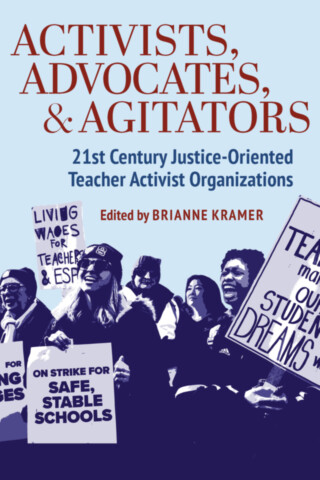
2025 SPE Outstanding Book Award Honorable Mention
In recent years, the field of education has been fraught with a variety of different challenges. A multi-year pandemic, book banning, and legislative efforts seeking to ban Critical Race Theory and LGBTQ positive curriculum have had negative effects on K-12 education, leaving many educators feeling the progress made in several states and communities before and during the 2018 teacher walkouts and strikes was now gone. Teacher morale is sitting at a historic low point, with teachers leaving the profession in droves. Education as an institution is at a crucial tipping point, and changes focused on equity and reducing the neoliberal hold on reform need to be implemented in order to keep schools as democratic spaces. The way this vision can be realized is through activism and existing social movement organizations that use both traditional and netroots practices. The purpose of Activists, Advocates, and Agitators is to provide readers with a history and analysis of 21st century teacher activism in K-12 schools to better understand the effectiveness of organizing and activism. Additionally, the text will introduce readers to present-day activist groups whose work is positively changing education and schools and the ways in which some teachers are working within their communities to assist in their specific needs.
Activists, Advocates, and Agitators is the perfect book to instruct preservice teachers about the conditions that they will face in their classrooms, arming them with valuable strategies to help them to achieve their academic goals.
Perfect for courses such as: Social Foundations of Education; Foundations of Education; Education Policy; Educational Leadership; Teacher Leadership; Sociology of Education; Politics of Education; and Democratic Education
Library E-Books
We are signed up with aggregators who resell networkable e-book editions of our titles to academic libraries. These editions, priced at par with simultaneous hardcover editions of our titles, are not available direct from Stylus.
These aggregators offer a variety of plans to libraries, such as simultaneous access by multiple library patrons, and access to portions of titles at a fraction of list price under what is commonly referred to as a "patron-driven demand" model.
E-books are now distributed via VitalSource
VitalSource offer a more seamless way to access the ebook, and add some great new features including text-to-voice. You own your ebook for life, it is simply hosted on the vendor website, working much like Kindle and Nook. Click here to see more detailed information on this process.
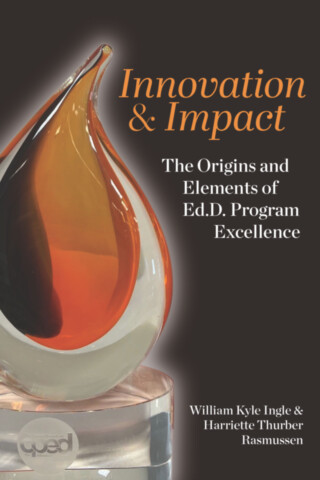
Professional and educational associations, such as the Carnegie Project for the Education Doctorate (CPED), create and offer awards that recognize the accomplishments of individuals, programs, and institutions. In this edited book, W. Kyle Ingle and Harriette Thurber Rasmussen focus on CPED’s Program of the Year (POY) Award, examining its history, purpose, submission requirements, its committee structure, activities, and outcomes. Faculty members from CPED’s award-winning institutions have been invited to discuss their innovative programs, how these innovations were developed, how they pursue social justice, and how these innovations have been sustained since winning the award. Furthermore, the award’s role in facilitating the diffusion of innovative and effective practices among CPED member institutions is examined. The book and its chapters are framed through the lens of innovation diffusion theory. Popularized by communication theorist Everett Rogers (1967, 2003), innovation diffusion theory has spread widely across the social sciences. In his seminal work, Diffusion of Innovations, Rogers defines an innovation as “an idea, practice, or object that is perceived as new by an individual or other unit of adoption” (2003, p. 12). Innovation diffusion is the process by which an innovation spreads among the members of a social system, in this case the internal and external communities of Ed.D.-granting institutions.
The book includes dual components: (1) innovative programs that drive social justice and (2) how these institutional innovations were developed and sustained. The latter component will shed light on three self-study processes related to these award-winnng programs:
- The process of creating the featured innovative program;
- The process of applying for the program of the year award; and
- The process of writing the journey and considering the impact of the program of the year award on their institution, including any reinvention/adaptations.
Perfect for courses such as: Program Development & Assessment in Higher Education; Instructional Planning for Student Learning and Achievement; Performance Improvement; Instructional Design and Development; e-Learning Design and Development; College Teaching; Supervised Experience in Higher Education; Special Problems in Educational Leadership; Professional Projects in Higher Education; Organizational Improvement in Higher Education
Library E-Books
We are signed up with aggregators who resell networkable e-book editions of our titles to academic libraries. These editions, priced at par with simultaneous hardcover editions of our titles, are not available direct from Stylus.
These aggregators offer a variety of plans to libraries, such as simultaneous access by multiple library patrons, and access to portions of titles at a fraction of list price under what is commonly referred to as a "patron-driven demand" model.
E-books are now distributed via VitalSource
VitalSource offer a more seamless way to access the ebook, and add some great new features including text-to-voice. You own your ebook for life, it is simply hosted on the vendor website, working much like Kindle and Nook. Click here to see more detailed information on this process.
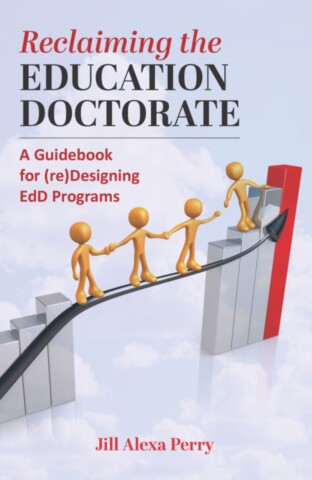
Reclaiming the Education Doctorate: A Guidebook for (re)Designing EdD Programs is a practical guide for those seeking to (re)design a professional practice doctorate program in education that prepares Scholarly Practitioners. To tackle the comprehensive change process necessary for (re)designing the EdD, this book will guide the reader with an improvement lens that looks at the roots of the confusion of the EdD, the system that created it, and the framework that helped to reclaim it.
Readers will be guided through a backward mapping (re)design process that begins with defining graduate outcomes, maps through the milestones and courses, ends with rethinking the admissions process. Along the way, readers will learn how to design and integrate a dissertation in practice into the curriculum, consider best practices for their program (re)design, and view examples of successful programs. Additionally, to support readers in their (re)design efforts, each chapter will offer exercises, tools, and resources that will guide the process. The book will prove to be an invaluable resource for anyone developing or revising their EdD program.
After the opening chapter that explains the mission statement of Reclaiming the Education Doctorate, Jill Perry structures chapters to deal with the full range of issues that impact EdD programs, including:
- Roots of the EdD Problem
- Aim: The Professional Practice Doctorate Driving Change
- Backward mapping: beginning with the end
- The heart of the program: Curriculum
- The beginning: Admitting Candidates
- Measuring Impact
- Leading Change
Library E-Books
We are signed up with aggregators who resell networkable e-book editions of our titles to academic libraries. These editions, priced at par with simultaneous hardcover editions of our titles, are not available direct from Stylus.
These aggregators offer a variety of plans to libraries, such as simultaneous access by multiple library patrons, and access to portions of titles at a fraction of list price under what is commonly referred to as a "patron-driven demand" model.
E-books are now distributed via VitalSource
VitalSource offer a more seamless way to access the ebook, and add some great new features including text-to-voice. You own your ebook for life, it is simply hosted on the vendor website, working much like Kindle and Nook. Click here to see more detailed information on this process.
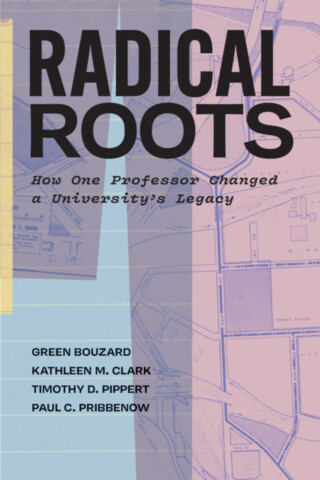
Radical Roots: How One Professor Changed a University's Legacy tells the story of Joel Torstenson, a sociology professor at Augsburg University in Minneapolis, Minnesota. In the 1960s, Torstenson challenged his university to embrace its urban setting and to design its curricular, co-curricular, and community engagement programs to advance its mission of “Education for service.” The compelling story of Torstenson’s legacy at Augsburg over the past 60 years offers lessons for colleges and universities across the country committed to democratic engagement in their work at the intersections of mission and place.
Augsburg University's saga as an urban settlement has not always been embraced by the university. Though location and place are central to the university’s identity, it is not sufficient to explain the integrative power of the university’s character. For that purpose, it is critical that place be understood through the lens of Augsburg’s academic mission and work. This integrated view of place and mission required a new way of imagining the university’s core work of educating students.
The purpose of this book is two-fold. The first is to document and celebrate the legacy of Professor Joel Torstenson, and to understand the impact of this legacy’s inception, evolution, and current manifestations and impact at Augsburg and in the wider world. Professor Torstenson cared deeply about the public purpose of higher education, and Torstenson’s model for what this public purpose might look like prompted massive transformation in Augsburg University’s trajectory. The resulting experiments in education and commitment to the city flowered into a legacy that has spurred Augsburg University to create an innovative model for 21st Century education. This model has impacted everything from student learning and community life, to teaching and curricular structure, to the public mission of the institution and its presence in the city and world. Torstenson’s creative—and even radical—work in the 1960s and '70s has been carried through the decades by continued innovation in teaching and learning based in experiential education, and a commitment to place and community building. This legacy has simultaneously advanced the public purpose and mission of the University.
Secondly, this book shares what are some of the lessons learned from fifty years of innovation following Torstenson’s vision, with the hope that these lessons might serve the broader community of colleges, universities, faculty, staff, and students engaged in similar pursuits. Augsburg’s innovative experiential education, place-based community engagement, and public and anchor institution work has been and will continue to be a model for other institutions. We believe that Torstenson’s legacy, and the lessons learned through the years of its evolution, has lessons to teach and models to follow for our sibling institutions across the United States.
The volume includes discussion prompts and questions after each section. There is also a companion website (www.augsburg.edu/radicalroots) that includes additional resources related to the volume's themes.
Perfect for course such as: Higher Education and Democracy in the United States; Principles of Experiential Education; Place Matters: Higher Education and Community Engagement; Universities as Anchor Institutions in their Communities; Introduction to Citizen Professionalism: Leading in the 21st Century; Public Work, Social Responsibility, and Vocation in a World of Extremes; Accompaniment: Developing Democratic Skills and Fostering Healing with Communities; Curricular Innovations in Higher Education; and Principles of Higher Education Pedagogy
Library E-Books
We are signed up with aggregators who resell networkable e-book editions of our titles to academic libraries. These editions, priced at par with simultaneous hardcover editions of our titles, are not available direct from Stylus.
These aggregators offer a variety of plans to libraries, such as simultaneous access by multiple library patrons, and access to portions of titles at a fraction of list price under what is commonly referred to as a "patron-driven demand" model.
E-books are now distributed via VitalSource
VitalSource offer a more seamless way to access the ebook, and add some great new features including text-to-voice. You own your ebook for life, it is simply hosted on the vendor website, working much like Kindle and Nook. Click here to see more detailed information on this process.
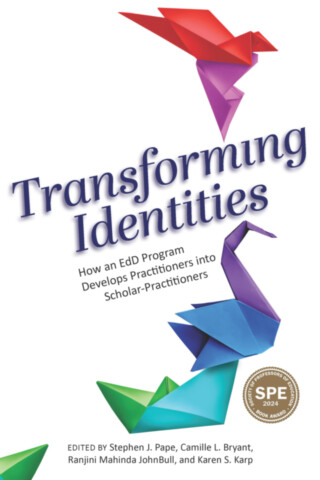
2024 SPE Outstanding Book Award Honorable Mention
Transforming Identities is the story of one doctoral program that was developed to transform the individuals who participated in the program personally and professionally, leading to improved ways of working within their professional practice. The book details the components of the program believed to have contributed to students' transformed personal and professional identities. The description of the program serves as a frame for 14 individual, compelling stories of transformation. These stories include identities experienced during the program, programmatic components that were mechanisms for change, and the impact of these alums' transformation on their professional organizations. In the final chapter, the editors look across the alums' stories of transformation to inform those who are developing/redeveloping doctor of education programs. Mechanisms of change highlighted by these former students include courses, communities of practice, advisers, and comprehensive examination. The book also synthesizes alums' descriptions of the phases of their transformation, what it means to be a scholar-practitioner, and what meaningful contributions “look like” within their professional contexts.
The Johns Hopkins University (JHU) Doctor of Education (EdD) program was created with the expressed programmatic outcome of developing leaders who possess the knowledge, skills, and dispositions to rigorously examine educational problems of practice with stakeholders within their context of professional practice. Transforming Identities frames this discussion of identity transformation from an improvement science perspective as depicted by Bryk et al. (2015) (see also Author et al., 2022). Using this framework for the Applied Dissertation, the program supported its scholar-practitioners to partner with their colleagues in educational institutions and to independently take on the challenges and opportunities they encountered in their work within their context of professional practice. The initial chapters in the book provide an overview of the EdD program, to frame the remaining chapters in which graduates from the program describe their inspirational stories of transformation. They describe the ways in which the program components, including their dissertation, transformed their identity as well as their work within their context of professional practice. These stories present the ways in which these change agents within their organizations have served as insiders who, with greater knowledge and access to knowledge, were able to become the bridge between research and practice, and practice and research and thereby change their organizations from the inside. These stories of transformation highlight how their skills and insights accurately identify the variability in the contexts in which their problem of practice is situated, the variability in the successes of interventions within similar contexts, and the most appropriate way to move the organization forward toward improved outcomes. Each chapter tells the author’s story of transformation from practitioner to scholar-practitioner through the dissertation study and beyond.
Library E-Books
We are signed up with aggregators who resell networkable e-book editions of our titles to academic libraries. These editions, priced at par with simultaneous hardcover editions of our titles, are not available direct from Stylus.
These aggregators offer a variety of plans to libraries, such as simultaneous access by multiple library patrons, and access to portions of titles at a fraction of list price under what is commonly referred to as a "patron-driven demand" model.
E-books are now distributed via VitalSource
VitalSource offer a more seamless way to access the ebook, and add some great new features including text-to-voice. You own your ebook for life, it is simply hosted on the vendor website, working much like Kindle and Nook. Click here to see more detailed information on this process.



